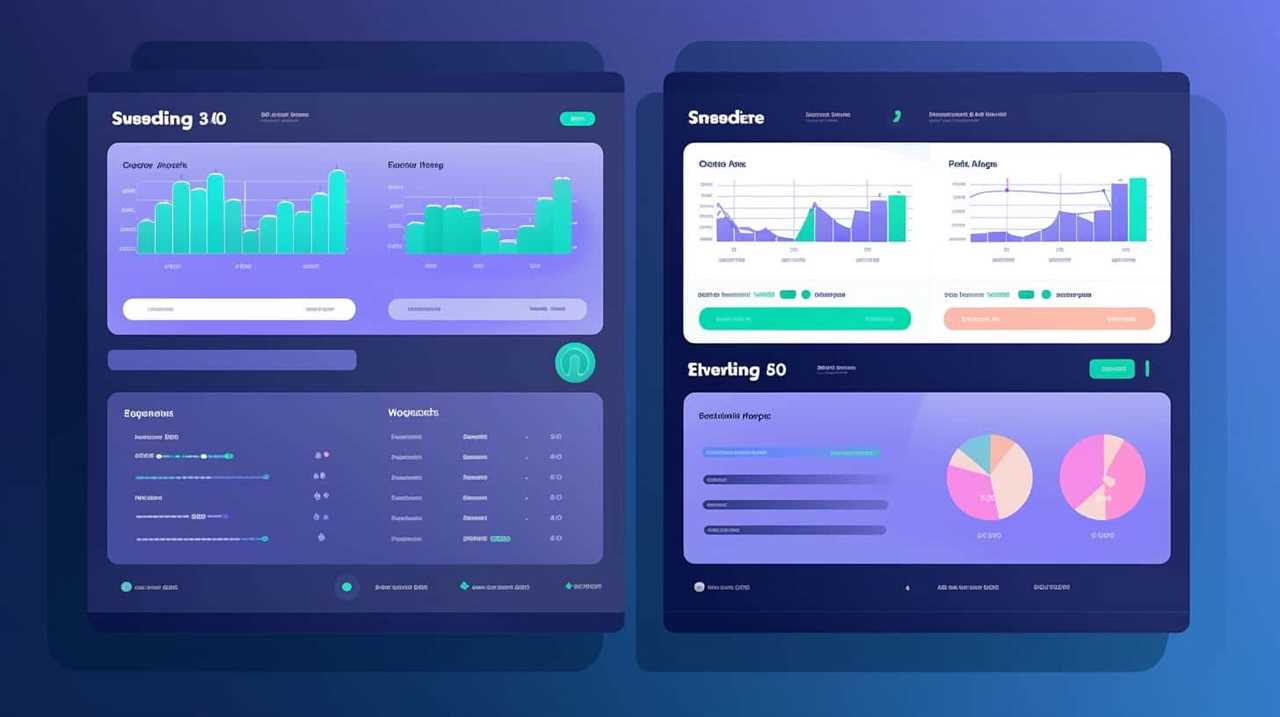Welcome to our guide on crafting SEO titles, where we’ll unveil the crucial tactics to develop captivating titles that boost your website’s visibility and lead to more organic traffic.
Think of SEO titles as the gateway to your content – they’re like the shiny book covers that entice readers to take a closer look.
In this article, we’ll walk you through the definition, importance, and best practices for creating effective SEO titles.
Get ready to master the art of captivating your audience with attention-grabbing titles!

Key Takeaways
- SEO titles are like book covers that attract readers to your content.
- Well-optimized SEO titles are influential in search engine rankings and drive website traffic.
- Avoid using generic titles that don’t accurately describe the content.
- Google advises against keyword stuffing or using misleading SEO titles.
The Definition of an SEO Title
In our article, we’ll explore the precise definition of an SEO title.
When it comes to writing SEO titles, there are common mistakes that can hinder your search engine rankings. One such mistake isn’t including relevant keywords in your title. Keywords play a crucial role in helping search engines understand the content of your webpage.
Another mistake is using a title that’s too long. SEO title length directly impacts search engine rankings, as search engines typically display only a certain number of characters in the search results. It’s important to keep your SEO title concise and within the recommended length to maximize its visibility and effectiveness.
The Importance of SEO Titles
To further understand the significance of SEO titles, let’s delve into the quantifiable impact they have on improving search engine rankings. Here are four key reasons why SEO titles are important:

- Keyword Optimization: SEO titles play a crucial role in optimizing your website for relevant keywords. By incorporating targeted keywords into your titles, you can increase your visibility in search engine results.
- Improved CTR: An attractive and well-optimized SEO title can significantly improve your click-through rate (CTR). When users see a compelling title that matches their search intent, they’re more likely to click on your website, increasing your organic traffic.
- Search Engine Rankings: SEO titles are one of the most influential factors that search engines consider when ranking web pages. Optimized titles can help your website rank higher in search results, leading to increased visibility and organic traffic.
- Impact of Meta Descriptions: While meta descriptions don’t directly affect search engine rankings, they do impact click-through rates. When meta descriptions align with your SEO titles and provide a concise summary of your page content, they can entice users to click on your website.
How to Create Effective SEO Titles
Now let’s delve into the process of crafting effective SEO titles, building upon the importance discussed in the previous subtopic.
When creating SEO titles, it’s crucial to avoid common mistakes that can hinder your website’s visibility and ranking. One common mistake is using generic titles that don’t accurately describe the content of the page. Instead, focus on creating titles that are specific, relevant, and contain targeted keywords.
Another mistake to avoid is stuffing keywords unnaturally into the title, as this can make it appear spammy and harm your SEO efforts.
To create successful SEO titles, take note of examples from reputable websites that have achieved high rankings. Study their use of compelling language, strong keywords, and concise yet informative titles.

Best Practices for Optimizing SEO Titles
Let’s continue our discussion on optimizing SEO titles by exploring the best practices to follow.
When it comes to SEO title length, it’s important to strike a balance between being concise and including relevant keywords. Here are four key practices to keep in mind:
- Keep it short and sweet: Aim for an SEO title length of 50-60 characters to ensure it displays properly in search engine results.
- Front-load with keywords: Place your most important keywords at the beginning of the title to maximize visibility and relevance.
- Avoid keyword stuffing: While it’s important to include keywords, don’t overdo it. Maintain a natural flow and readability.
- Create unique titles: Each page on your website should have a distinct SEO title that accurately reflects its content and target keywords.
Tools and Resources for SEO Title Optimization
Continuing our exploration of optimizing SEO titles, let’s delve into the tools and resources available for SEO title optimization. When it comes to creating effective SEO titles, two key factors to consider are the length and formatting. To ensure your titles are optimized for search engines, it’s important to keep them within the recommended SEO title length, which is typically around 50-60 characters. This helps to ensure that your titles are fully displayed in search engine results pages (SERPs) and are not cut off. In terms of formatting, using keywords at the beginning of your title, separating them with pipes or dashes, and including numbers or compelling adjectives can help attract more clicks. To help you optimize your SEO titles, here are some tools and resources you can use:
| Tool/Resource | Description |
|---|---|
| Yoast SEO Plugin | A popular WordPress plugin that provides real-time feedback on your SEO title length and formatting. |
| Google Search Console | Allows you to analyze your website’s performance in search results and provides insights on your SEO titles. |
| CoSchedule Headline Analyzer | A tool that evaluates the headline quality of your SEO titles and offers suggestions for improvement. |
| SEMrush | A comprehensive SEO tool that provides keyword research, competitive analysis, and optimization recommendations for your SEO titles. |
Frequently Asked Questions
How Long Should an SEO Title Be?
When it comes to SEO title length, it’s important to find the right balance. Too short and you may not capture the attention of search engines or users. Too long and your title may get cut off in search results.

The ideal length for an SEO title is around 50-60 characters. This allows you to include relevant keywords and provide a concise and compelling description of your content. Remember, the keywords in your SEO title play a crucial role in boosting your search engine visibility.
Are There Any Restrictions or Guidelines for Using Keywords in an SEO Title?
When it comes to using keywords in an SEO title, there are definitely some restrictions and guidelines to keep in mind. Keyword density is key, but it’s important to strike a balance and not overdo it.
Best practices suggest using relevant keywords that accurately reflect the content of the page. By following these guidelines, we can optimize our SEO titles and improve our chances of ranking higher in search engine results.
Can I Change the SEO Title of a Web Page Without Affecting Its Ranking?
When changing the SEO title of a web page, it’s important to consider its impact on ranking. We must carefully evaluate whether altering the SEO title will have a positive or negative effect on our page’s ranking in search engine results.

Should I Include My Brand Name in Every SEO Title?
When considering whether to include our brand name in every SEO title, there are pros and cons to consider.
On one hand, including our brand name can help increase brand recognition and visibility in search results.
On the other hand, it can make the title longer and potentially reduce the space available for important keywords.
Ultimately, the decision should be based on our specific goals and priorities, weighing the potential benefits and drawbacks.

How Often Should I Update or Change My SEO Titles for Better Search Engine Visibility?
To optimize our website for better search engine visibility, we should regularly update our SEO titles. By doing so, we increase the chances of our content being found by search engines.
Best practices for updating SEO titles include incorporating relevant keywords, making them concise and compelling. Regularly refreshing our titles ensures that they align with current search trends and keep our content relevant.
This practice helps improve our search engine rankings and drives more organic traffic to our site.
Conclusion
In the vast landscape of the digital world, SEO titles act as beacons, guiding both users and search engines towards relevant content.

Like the bright stars that illuminate a dark sky, a well-crafted SEO title captures attention, entices curiosity, and leads the way to valuable information.
By understanding the importance of SEO titles and implementing best practices, you can ensure that your online presence shines brightly, attracting and engaging your target audience.
Let your SEO titles be the guiding stars in your digital journey.










